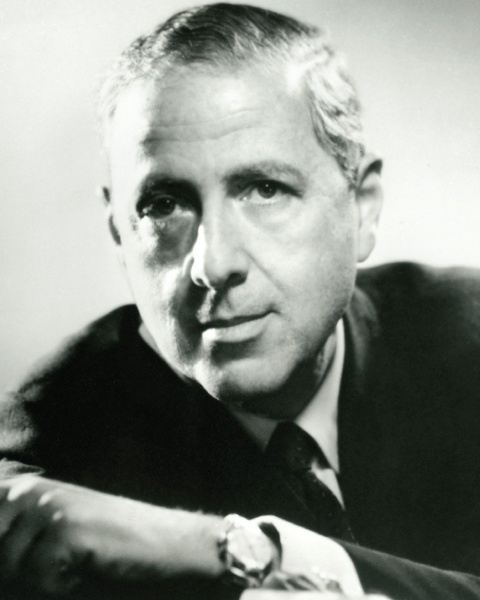Columbia College | Columbia University in the City of New York
Herman Wouk CC 1934, Prolific Author Known for Epic Wartime Novels

Herman Wouk CC 1934, an author whose sweeping novels won him both popular and critical acclaim — including the Pulitzer Prize for his bestselling shipboard drama, The Caine Mutiny — died on May 17, 2019, at his home in Palm Springs, Calif. He was just 10 days shy of his 104th birthday.
Wouk’s career ranged from the novel Aurora Dawn, a satire about radio admen (1947), to nonfiction such as This Is My God (1959) and The Language God Talks (2010), to his memoir, Sailor and Fiddler: Reflections of a 100-Year-Old Author (2016). More than 30 years after graduating from the College, reflecting on his experience in the essay, “A Doubled Magic,” Wouk wrote, “All my writings, such as they are, trace back in one sense or another to my four years at Columbia.”
Wouk was born on May 27, 1915, in the Bronx, the middle child of three, to Abraham and Esther (née Levine). At the College, where he majored in comparative literature and philosophy, he studied with Irwin Edman CC 1916, GSAS 1920, a philosopher whose conservative skepticism temporarily led Wouk away from the Orthodox Judaism in which he was raised. Wouk wrote a humor column for Spectator, edited Jester and dreamed of a career writing comedy for the Broadway stage. Through a classmate, he found work after graduation as an apprentice radio gag writer, and in 1936 became a staff writer for radio comedian Fred Allen.
Immediately after Pearl Harbor, Wouk enlisted in the Navy, entered midshipman’s school and was posted as a radio officer to the U.S.S. Zane. While on board he read Don Quixote, which turned his ambitions from the stage to novel writing. He sent four chapters of Aurora Dawn to Edman, who placed it with Simon & Schuster. The book sold reasonably well, as did his semi-autobiographical novel The City Boy (1948).
With The Caine Mutiny (1951), Wouk struck gold. A drama on the high seas leading up to a riveting courtroom scene, it sold more than three million copies in the United States alone, won the Pulitzer Prize for fiction in 1952 and was made into a movie in 1954. Wouk adapted the courtroom scenes into a hit Broadway play, The Caine Mutiny Court-Martial, also in 1954. He had already made his Broadway debut in 1949 with The Traitor and returned to Broadway with Nature’s Way in 1957.
In the book Marjorie Morningstar (1955), the heroine is a middle-class Jewish girl who dreams of becoming an actress, but learns to settle, happily, for life as a wife and mother. The novel inspired the 1958 film of the same name. Wouk delivered another blockbuster with Youngblood Hawke (1962).
By 1958 Wouk had moved to the Virgin Islands, and began planning an epic-scale novel dealing with WWII. In 1964 he moved to Washington, D.C., to do research, and also traveled the world to interview military leaders. In the end he wrote two novels: The Winds of War (1971), which covered the signing of the Nazi-Soviet pact in 1939 to the attack on Pearl Harbor, and War and Remembrance (1978), which carried the story forward through the liberation of the concentration camps and the dropping of the atom bomb. The first TV mini-series installment of The Winds of War, broadcast in 1983, attracted 80 million viewers; War and Remembrance was broadcast in 1988.
After writing the autobiographical novel Inside, Outside (1985), Wouk applied his epic formula to modern Israel in The Hope and The Glory (both 1994). A conversation with his brother, Victor ’39, an electrical engineer who had worked on the Manhattan Project, provided Wouk with the subject matter for A Hole in Texas (2004). For his comic novel The Lawgiver (2012), Wouk told his tale in a modernized epistolary style, furnishing letters, memos, emails, Twitter posts and text messages written by his characters.
Wouk’s wife, the former Betty Sarah Brown, who represented him after founding the BSW Literary Agency in 1979, died in 2011. He was also predeceased by his brother in 2005; sister, Irene Wouk Green, in 2004; and son, Abraham, in 1951. He is survived by his children Iolanthe Woulff and Joseph Wouk ’75, LAW’79; three grandchildren; and two great-grandchildren.
— Lisa Palladino
Issue Contents
Published three times a year by Columbia College for alumni, students, faculty, parents and friends.
Columbia Alumni Center
622 W. 113th St., MC 4530, 6th Fl.
New York, NY 10025
212-851-7852
cct@columbia.edu
Columbia Alumni Center
622 W. 113th St., MC 4530, 4th Fl.
New York, NY 10025
212-851-7488
ccalumni@columbia.edu

